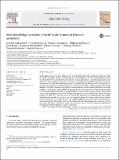Files in this item
New knowledge networks of small-scale farmers in Europe’s periphery
Item metadata
| dc.contributor.author | Sutherland, Lee-Ann | |
| dc.contributor.author | Madureira, Livia | |
| dc.contributor.author | Dirimanova, Violeta | |
| dc.contributor.author | Bogusz, Malgorzata | |
| dc.contributor.author | Kania, Jozef | |
| dc.contributor.author | Vinohradnik, Krystyna | |
| dc.contributor.author | Creaney, Rachel Sarah | |
| dc.contributor.author | Duckett, Dominic | |
| dc.contributor.author | Koehnen, Timothy | |
| dc.contributor.author | Knierim, Andrea | |
| dc.date.accessioned | 2018-01-18T10:30:13Z | |
| dc.date.available | 2018-01-18T10:30:13Z | |
| dc.date.issued | 2017-04 | |
| dc.identifier | 252085258 | |
| dc.identifier | d522d8bb-15f9-46e6-a83c-d4e1e90573ec | |
| dc.identifier | 85013212303 | |
| dc.identifier | 000401398600040 | |
| dc.identifier.citation | Sutherland , L-A , Madureira , L , Dirimanova , V , Bogusz , M , Kania , J , Vinohradnik , K , Creaney , R S , Duckett , D , Koehnen , T & Knierim , A 2017 , ' New knowledge networks of small-scale farmers in Europe’s periphery ' , Land Use Policy , vol. 63 , pp. 428-439 . https://doi.org/10.1016/j.landusepol.2017.01.028 | en |
| dc.identifier.issn | 0264-8377 | |
| dc.identifier.uri | https://hdl.handle.net/10023/12506 | |
| dc.description | Funding for this research was provided by the European Union’s Seventh Framework Programme for research, technological development and demonstration under grant agreement no 311994, and the Scottish Government’s Strategic Research Programme (2011–2016). | en |
| dc.description.abstract | In this paper we assess the types of knowledge networks utilised by small-scale farmers in four case studies (located in Bulgaria, Poland, Portugal, and the United Kingdom). We focus on knowledge acquired to inform three new activities being undertaken by study participants: agricultural production, subsidy access and regulatory compliance, and farm diversification (specifically agritourism). Findings demonstrate that the new knowledge networks are dominated by different forms of expertise: formal ‘agricultural advisors’ identified in the case studies primarily offer codified managerial knowledge through centralised networks, suggesting that state-funded services for small-scale farmers are largely embedded in traditional, linear models of knowledge transfer. Production and diversification knowledge is exchanged through ‘distributed’ and ‘decentralised’ networks, where a range of actors are involved across varying geographical distances. Findings highlight issues associated with the quality and independence of both ‘free’ and paid advice, as well as the importance of combining tacit and codified knowledge for credibility. In all four cases, we found that small-scale farmers utilise formal advisory services primarily for accessing subsidies (e.g. completing application forms), rather than acquiring production knowledge. The authors argue that by utilising the state funding allocated to advisory services for small-scale farmers primarily to enable these farmers to access subsidies, important opportunities for innovation by both advisors or farmers can be lost. | |
| dc.format.extent | 850619 | |
| dc.language.iso | eng | |
| dc.relation.ispartof | Land Use Policy | en |
| dc.subject | AKIS | en |
| dc.subject | Farm advisory services | en |
| dc.subject | Networks | en |
| dc.subject | New entrants | en |
| dc.subject | PRO AKIS | en |
| dc.subject | G Geography (General) | en |
| dc.subject | HD Industries. Land use. Labor | en |
| dc.subject | S Agriculture (General) | en |
| dc.subject | NDAS | en |
| dc.subject | SDG 2 - Zero Hunger | en |
| dc.subject | SDG 15 - Life on Land | en |
| dc.subject.lcc | G1 | en |
| dc.subject.lcc | HD | en |
| dc.subject.lcc | S1 | en |
| dc.title | New knowledge networks of small-scale farmers in Europe’s periphery | en |
| dc.type | Journal article | en |
| dc.contributor.institution | University of St Andrews. School of Geography & Sustainable Development | en |
| dc.identifier.doi | 10.1016/j.landusepol.2017.01.028 | |
| dc.description.status | Peer reviewed | en |
This item appears in the following Collection(s)
Items in the St Andrews Research Repository are protected by copyright, with all rights reserved, unless otherwise indicated.

